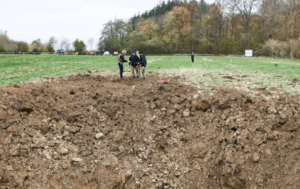Opinion
Opinion: Disrespecting the dead, endangering the living
Bob Cobley
This article is more than 2 years old.

The recent detonation of a bomb discovered my metal detectorists at Kær Hestehave left a huge crater (photo: CWGC)
Following many bad experiences over the years, the Commonwealth War Graves Commission (CWGC) invariably takes a very dim view of the increasing number of cases in which amateurs armed with metal detectors disturb or attempt to disturb the many RAF crash sites from World War II.
In Denmark, the recent near disaster on the island of Als is just one reprehensible example, when a group of 30 adults and children used metal detectors to search among the wreckage of a Halifax plane.
On this occasion, it was reprehensible, disrespectful and dangerous for 30 amateurs including their children to dig deeper “for personal effects” in a field where eight young men died.
Averted disaster in Als
When they dug too deeply [according to the Code of Practice set by Mijløministeriet, the limit below the top soil is 25cm], things became very serious indeed when it transpired they had actually located – not, as they thought, the Halifax’s oxygen tanks – but two armed and unexploded 1,000-pound bombs. The police quickly took emergency action and cordoned off the site.
Not only this, but the Bomb Disposal Squad also had to be called out. Its officers deemed the bombs unstable and some 300 to 400 (police estimates) local people were forced to leave their homes at short notice for a night on the unwelcoming hard floor of a sports hall.
They were required to leave behind all their personal possessions, including pets that were left to fend for themselves and livestock that couldn’t be watered or attended.
Despite the safe destruction of the two bombs, some nearby houses suffered damage and a very large crater had to be filled in. Meanwhile, 30 bomb disposal experts searched the rest of the site in search of further bombs.
No tragedy … this time
When interviewed by a local TV station, the group leader initially stated they were “only looking for personal belongings for their museum”, but this was not repeated in later statements, by which time he perhaps realised this was unethical.
This is one reason why CWGC requires that any personal belongings should be reported to the authorities. In some cases, they may aid the identification of a casualty who could not be named at the time of their burial. Occasionally they might indicate the presence of remains not discovered during the war.
In one such sad case in their hunt for souvenirs, thoughtless people have removed ID tags from a body so the identity of this casualty remains to this day “Known Unto God” – the wording of the CWGC commemoration.
Another member of the group from Als boasted that he had hit one of the bombs with his spade. This is exactly what a contemptuous German soldier did nearly 80 years ago, when he petulantly kicked another bomb on the day after the crash.
He was less fortunate than the searcher was this time.

About
Bob Cobley
Robert Graham Cobley MBE is the Honorary Representative for Denmark at the Commonwealth War Graves Commission. Before his retirement he worked for the British Embassy in Copenhagen.










































